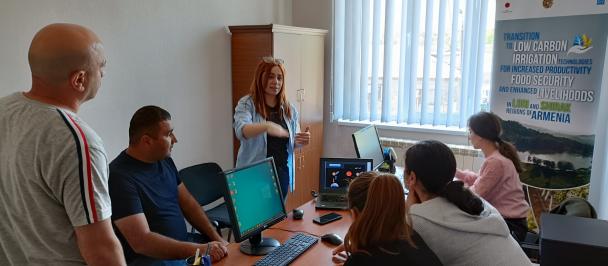
In Utrik Atoll, water is life and resilience. As climate change disrupts freshwater sources, communities adapt with care, ingenuity, and support from the ACWA Project.
Utrik, Marshall Islands - In Utrik Atoll, where the vast Pacific meets the sky, water is both a necessity and a challenge. It dictates daily routines, from washing clothes and cooking meals to fetching drinking water from distant sources. Every drop is both precious and carefully managed to sustain life on this remote island.
However, the challenges of water scarcity in Utrik are not isolated. The melting of glaciers, driven by rising greenhouse gas emissions, is accelerating sea level rise, threatening freshwater sources in low-lying islands like the Marshall Islands. As ocean levels rise, saltwater intrudes into underground aquifers, making groundwater undrinkable and increasing the dependence on rainwater, which itself is becoming less predictable due to climate change.
Under the shade of a vibrant red tarp, a woman soaks clothes in large plastic basins filled with well water. Here, laundry is a meticulous process. Clothes are pre-soaked overnight in soapy water to loosen dirt, ensuring minimal water is needed for scrubbing and rinsing the next day. Unlike in many places, laundry is not strictly a women’s task—men and women alike take turns washing clothes.
“Every three days, we do the laundry,” they explain, wringing out a piece of fabric. “We have to plan ahead because water isn’t always available.”
The bright hues of patterned dresses drying in the breeze contrast with the careful effort it takes to maintain them.
In Utrik, rainwater is too precious to waste, especially as climate change disrupts rainfall patterns. Reserved strictly for cooking and drinking, it is stored in large catchment tanks and carefully rationed. A woman kneels on the ground, pouring rainwater over a bowl of rice.
“We eat rice every day, so we need water to wash and cook it,” she says. “We also use water for boiling fish or making soups. But we use only what’s necessary.”
Morning in Utrik is filled with the scent of fresh pancakes frying over open fires. Across the village, families prepare breakfast by mixing flour with rainwater to create a simple batter.
“We never use well water for cooking unless we have no other choice,” she says.
When droughts hit and rainwater runs out, the community has no option but to boil well water for safe consumption.
Nearby, a woman is seen filling a bucket with well water. She gestures toward the two large basins used for washing dishes.
“We clean everything in two steps,” she explains. “First, we wash in the first tub, then rinse in the second, so we don’t waste water.”

Although rainwater is the primary source of drinking water, there is another option. Near the airstrip, a facility provides reverse osmosis water, purified for safe drinking.
However, this facility is some distance from the main village, requiring effort to transport water back home. Carrying heavy water containers is labor-intensive, but for many families, it is a necessity.
As sea levels rise, groundwater sources in Utrik are at increasing risk of contamination from saltwater intrusion. This makes it more difficult to rely on well water, even when boiled, as salinity levels continue to rise. Consequently, many households are left with fewer options, adding to the burden of fetching and treating water for daily use.

An elder of Utrik sits in the shade, reflecting on the difficulties of island life.
“It is not easy,” he admits. “It hasn’t rained much in months, and now our rainwater catchments are empty.”
Nearby, his son-in-law connects a hose from the well to refill the household’s empty rainwater tank.

Despite these challenges, the people of Utrik continue to support one another. Water is not just a resource—it is a communal responsibility.
“If someone runs out of water, we share,” one villager says. “You cannot refuse when a neighbour is in need.”
Efforts to improve water security are underway through the Addressing Climate Vulnerability in the Water Sector (ACWA) Project, which is strengthening climate resilience and enhancing access to safe water across the Marshall Islands across 24 neighbouring Atolls and Islands including Utrik Atoll. By improving rainwater harvesting systems, securing groundwater resources, and integrating climate risk management into water governance, the project is working to ensure that islanders no longer have to worry about their most essential resource.
As melting glaciers contribute to rising sea levels, projects like ACWA become critical in helping low-lying communities adapt to climate change. The ACWA Project is funded by the Green Climate Fund, the Government of the Republic of the Marshall Islands, and the European Union. The ACWA PLUS+ project, funded by Australia’s Department of Foreign Affairs and Trade, complements these efforts by addressing remaining water security gaps. Running from 2020 to 2027, the projects work to: improve household and community rainwater harvesting and storages, secure groundwater resources from contamination, and strengthen the technical capacities of national and subnational institutions and key stakeholders to integrate climate change risks into water governance processes.
In the heart of the Pacific, life on Utrik continues, shaped by water, resilience, and the unwavering strength of its people. However, without global action to reduce greenhouse gas emissions, rising sea levels will continue to threaten freshwater access, making climate adaptation projects like ACWA more critical than ever.
For more information contact:
Yuki Yamada | Communications Specialist, UNDP Pacific Office | yuki.yamada@undp.org

 Locations
Locations























